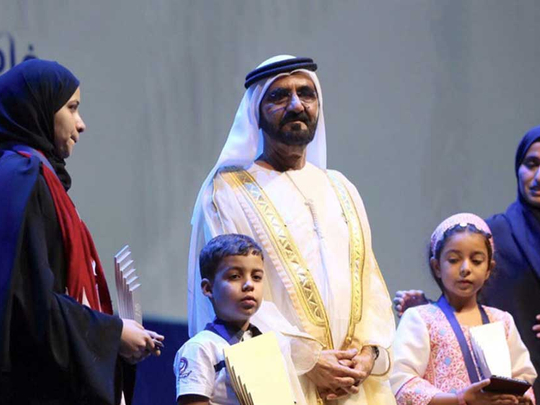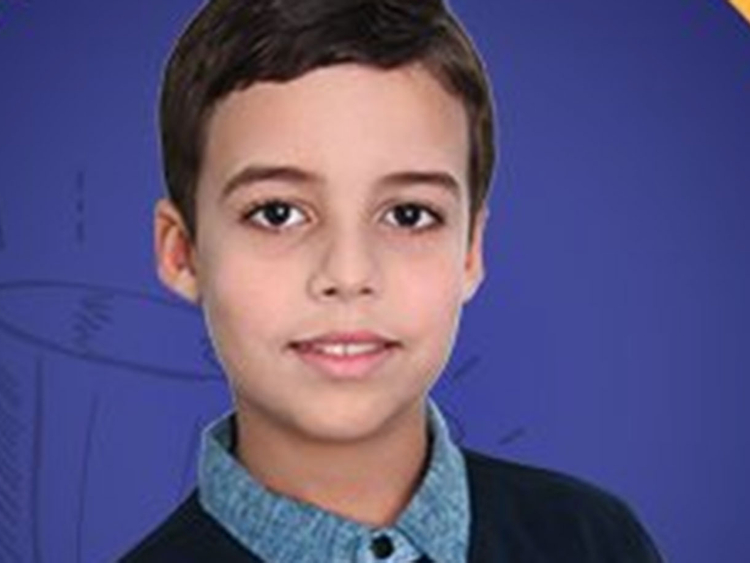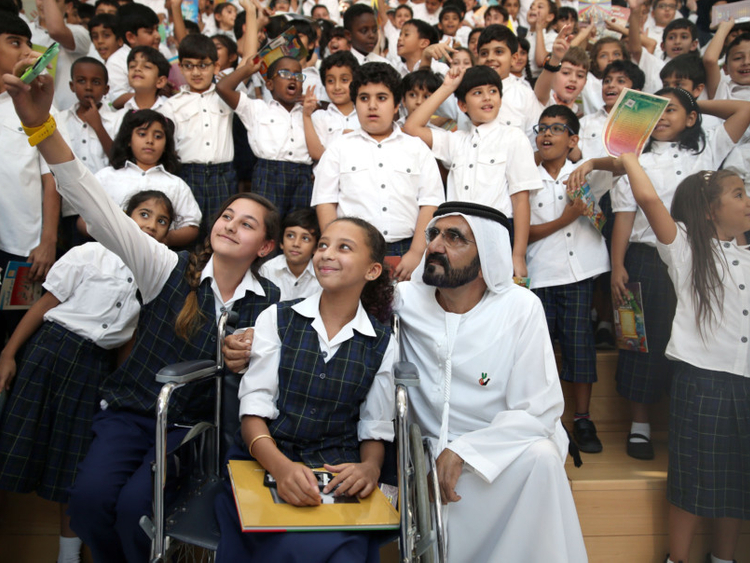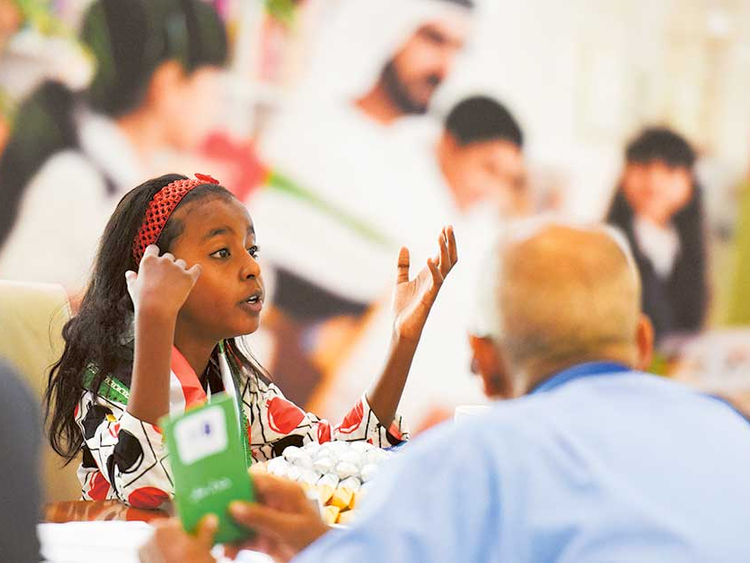
Dubai: Battling it out with more than three million participants from around the Arab world, seven-year-old Mohammad Farah from Algeria was announced as the champion of the Arab Reading Challenge.
Talaih Al Amal high school in Palestine, meanwhile, bagged the $1-million prize for the school with the best reading initiatives in the region.
The announcement was made at the closing award ceremony at the Dubai Opera House, where His Highness Shaikh Mohammad bin Rashid Al Maktoum, Vice-President and Prime Minister of the UAE and Ruler of Dubai presented the winners with their awards.
Farah received a $150,000 reward, of which $100,000 will be given in the form of a university scholarship and $50,000 in the form of a cash reward to her/his family for their encouragement.
The event was also attended by several VIP guests, government officials and participants from the Arab region.Cut down to 18 finalists on October 21 and 22 during a gathering at Dubai School, the competition named its final three finalists during the award ceremony.
Ruwa Hamu from Jordan came in at second place, and Wala Al Bakari from Bahrain in third after the audience took part in an instant voting poll, choosing Farah as the first winner of the competition.
7-year old Mohammed Abdullah Farah from Algeria wins the @ArabReading Challenge pic.twitter.com/0QnOBaaC0E— Dubai Media Office (@DXBMediaOffice) October 24, 2016
. @ArabReading award ceremony witnesses massive attendance #Dubai pic.twitter.com/k3GrvOK576
— Dubai Media Office (@DXBMediaOffice) October 24, 2016
.@HHShkMohd honors Tala'a Al Amal school from Palestine at the @ArabReading Challenge. The school received $ 1 million prize. pic.twitter.com/1lxqvnfsBx— Dubai Media Office (@DXBMediaOffice) October 24, 2016
تعاون ٦٠ الف مشرف من ٥٤ جنسية في ٢١ دولة على مشروع معرفي واحد .. تحدي القراءة دليل بأننا كعرب نستطيع العمل معا لإنجاز الكثير .. pic.twitter.com/98vf2cjvFX
— HH Sheikh Mohammed (@HHShkMohd) October 24, 2016
Shaikh Mohammad launched the Arab Reading Challenge in September 2015, with the aim to encourage a million students in the Arab world to read 50 million books.
The award ceremony was held at the Dubai Opera on Monday, where the three finalists out of the 18, chosen during Saturday and Sunday’s trial, took part in the finals.
. @HHShkMohd, in presence of @HamdanMohammed & Maktoum bin Mohammed, attends @ArabReading #Dubai #UAE pic.twitter.com/txJpBHXiWZ— Dubai Media Office (@DXBMediaOffice) October 24, 2016
#دبي تتوج اليوم بطل #تحدي_القراءة_العربي pic.twitter.com/9zYxQTrgfe— Dubai Media Office (@DXBMediaOffice) October 24, 2016
حضور كثيف في الحفل الختامي لـ #تحدي_القراءة_العربي، في "#دبي أوبرا" pic.twitter.com/wLp6P7LWKi— Dubai Media Office (@DXBMediaOffice) October 24, 2016
The total prize money for all the different categories is Dh11 million.
The categories include: best school from all participating countries, best supervisor from each UAE education zones, and best supervisor from each participating country, among other prizes.
Mohammad Abdullah Al Gergawi, Minister for Cabinet Affairs and the Future and chairman of ARC’s Organising Committee, said that the award exceeded expectations in terms of student participation.
The challenge’s 2015-16 edition attracted 3.59 million students from 54 nationalities, representing 30,000 schools in 21 countries, which was more than triple the target of one million students.
Over the weekend, 240 students from 21 countries made it to the UAE for the final challenge, after they beat more than 3.5 million students in the elimination stages.
Since September last year, these students have each read and summarised in detail at least 50 books — and some have exceeded that number.
The pan-Arab reading competition included school students in 15 Arab countries — UAE, Saudi Arabia, Egypt, Oman, Bahrain, Kuwait, Qatar, Lebanon, Jordan, Palestine, Tunisia, Sudan, Morocco, Algeria and Mauritania, with the aim of encouraging the culture of reading.
More than 60,000 teachers applied for the role of supervisors in the challenge.
Massive reading challenge
When Shaikh Mohammad first announced the ARC, he said: “The Arab world is suffering from a reading crisis whose consequences we see and feel every day in this region. The 50 million book challenge is the first of many steps we are taking in the hope of creating a long-term impact that would change this reality.”
He added: “Reading opens minds, magnifies hunger for knowledge, and instils the values of openness and moderation that define great civilizations.”
“The first book a child reads opens the first door in that child’s brighter future. The 50 million book challenge is the first of many steps. It will be followed by many initiatives. The goal is to create a new generation, a new hope and a new reality. Today we set this challenge for the Arab educational sector, Arab parents, and Arab children and youth. We have every faith in their abilities to achieve the goal.”
Under the competition’s guidelines, each of the 18 finalists faces a series of tough questions by the judging panel. Each of the 50 books read by participants must be in Arabic. If Arabic is not their first language, this number is reduced to 25.
Books on religion and science, as well as fictional novels, seemed to be popular with finalists.
Reading rate
According to statistics issued by the Arab Thought Foundation on cultural development, the annual average reading rate for an Arab child is six minutes compared to a 12,000 minute average for children in the West.
Tala’a Al Amal Highschool from Palestine, is one of the schools shortlisted for the best school from all participating countries category.
The school has a total of 3,100 students of which 800 participated in the challenge.
Al Iman schools – Girls from Bahrain has also qualified to the final stages.














